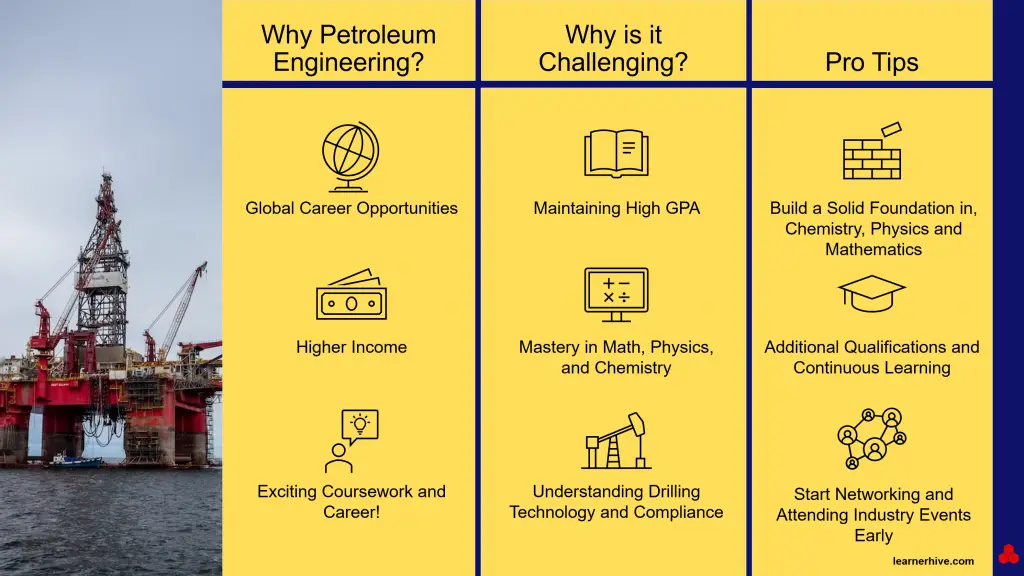Petroleum Engineering is a rigorous, technical major that requires students to work with math, science, geology, and oil reserves. Engineers in this field work with hydrocarbons such as oil and gas.
However, graduates working in this field enjoy high salaries and work-related perks. Therefore, we’ll look closely at the key reasons you might want to study petroleum engineering!
Is Petroleum Engineering Hard?
Petroleum Engineering is challenging because you will need to maintain a high GPA throughout your degree. Additionally, this course is rigorous, with a demanding curriculum consisting of calculus, physics, chemistry, geology, and mathematics. Perhaps the most challenging part is learning how to apply it to real-world situations! However, engineers in this field have multiple career options and earn a high income.
Let’s begin to discover the top 11 reasons for what to expect as a Petroleum Engineering student, so tune in!
1. Mastery of Mathematics
Petroleum engineers must master their mathematics skills before proceeding to more complex problems in the field.
In addition, this curriculum includes significant mathematics subjects, including multiple levels of calculus, statistics, linear algebra, and differential equations.
Once you’ve mastered this, you’ll be able to develop and improve plans when designing an oil rig or refinery! Let’s look at some of the complex mathematics curricula in this field.
2. Calculus, Linear Algebra, and Differential Equations
Students who choose this major will take three semesters of calculus and one semester each of linear algebra and differential equations.
Some components that students learn include how to work with single-variable functions in Calculus 1 and 2. In contrast, in Calculus 3, students learn derivatives and integrals of dimensions.
To succeed in this major, students must focus on solving mathematical problems. Therefore, students should avoid distractions everyone in college faces, such as excessive partying and procrastination.
Overall, a student needs to be able to perform math at the highest level by investing time and effort!

3. Understanding Physics, Chemistry, Thermodynamics, and Statistics
One of the most challenging subjects you will take in your fourth year of college, with two demanding semesters, is Oil and Gas Well Drilling Technology.
Indeed, the program aims to teach students about oil and gas wells, core samples, drilling rigs, and other equipment used in the industry.
Also, students will learn how to interpret data from sensors used during drilling operations.
Therefore, even though the coursework in this field is intense, it is still beneficial for students to implement new solutions to reduce their carbon footprints!
4. Oil and Gas Well Drilling Technology
One of the most challenging subjects you will take in your fourth year of college, with two demanding semesters, is Oil and Gas Well Drilling Technology.
Indeed, the program aims to teach students about oil and gas wells, core samples, drilling rigs, and other equipment used in the industry.
Also, students will learn how to interpret data from sensors used during drilling operations.
Therefore, even though the coursework in this field is intense, it is still beneficial for students so that they can implement new solutions to reduce their carbon footprints!
5. Requires Maintaining a High GPA in College
Students must maintain a high GPA throughout their undergraduate career and graduate school to get into prestigious universities.
Students could also obtain an internship with an oil and gas company to increase their chances of finding a career as a petroleum engineer after graduation.
Students must work hard to keep up with their schoolwork and not fall behind in their classes.
Lastly, as this course molds students with their interpersonal and networking abilities, it will eventually pay off as petroleum engineering is one of the top paying professions of all time!
6. Career Opportunities in Petroleum
Petroleum engineer salaries range between $70k – 150K. Graduates may also find work in related engineering fields.
On the other hand, if students are worried about having enough jobs in the next decade, employment is anticipated to expand by 8% between 2020 and 2030, to 2,100 job openings.
Undoubtedly, students who follow this career route have first-rate benefit packages and more significant income potential!
After all, if this sounds like something worth studying, we recommend doing further research before taking this course!
Learn more: Do engineers make good money?
7. Regulations in Petroleum and Sea and Land Oil Reserves

As a student of this course, you must also understand the industry’s laws and regulations that supervise oil and land safety standards.
Apart from this, students also need a thorough understanding of basic petroleum foundations. Foundation basic includes knowing how oil forms, what makes it flow through pipelines, oil storage, and how to create products such as gasoline.
All courses in this field, including Drilling and Well Completion, Petroleum Engineering Design, Process Safety, and Sustainability, could be taken in the fourth year over two semesters.
Above all, understanding these concepts and regulations will empower students to succeed in this major.
8. Requires Intermediate Computer Skills
Top engineers will know how a computer and software operate in addition to fundamental abilities.
For example, a capable engineer will comprehend how the CPU works with applications, networks, and operating systems.
During an internship, professional engineers will train students to take the lead in gas computing technologies and computer system configurations, programs, and data standards.
Additionally, interns may anticipate their internship will last six months until they receive their bachelor’s degree and march on their graduation rights!
Undeniably, students will encounter technical issues regularly while working in this field and need to solve those problems regularly.
9. Additional Certification and Licensing
Assuming you finished your academic requirements, internship, and graduation. The next thing on your mind is your license examination.
Accordingly, graduates can expect a six-month review period before their licensing exam. You are required to take the SPE Petroleum Engineering Certification and PE License Exam.
Engineering graduates who have earned their certifications and licenses are eligible to join SPE organizations.
10. Travelling to Remote Locations
Remote and far-off locations are the realities of life after becoming a professional and certified petroleum engineer.
Generally, you’ll be able to work in drilling and well sites where frequent travel is needed to visit these locations and meet with other engineers, oilfield professionals, and clients. Therefore, engineers may have to work overtime in these situations.
However, a similarly large chunk of the profile includes working in corporate offices. And the staff are given the standard office and travel perks.
11. Career Overseas and Growth in the Petroleum Industry
One major thing students should know is that petroleum engineering is a career that can take you worldwide! You could be working in Africa or on an oil rig off the coast of Alaska for a two-year contract or more!
In other words, students can anticipate working in domestic and international companies or government organizations.
Because they will engage with people from all backgrounds and nationalities daily, petroleum engineering students must have strong communication skills.
Lastly, you may also consider pursuing a master’s degree to become more marketable in today’s job market. A petroleum engineering master’s program typically lasts two years to finish.
By doing so, students will have plenty of opportunities to apply their knowledge and experience in different settings, allowing them to grow in their profession while balancing their personal lives!
To learn more, you can also see our posts on Chemical Engineering, Civil Engineering, Business Statistics, and Electrical Engineering.
Conclusion
Petroleum engineering is a challenging degree to study because it requires students to understand the oil and land reserves thoroughly.
In addition, the industry is constantly developing and changing, so students need to be able to keep up with new developments to remain competitive and beneficial.
Ultimately, it takes a lot of time and effort to learn these subjects. However, Petroleum Engineers are still considered one of the best professions in the world because they are highly paid for and respected by society!

